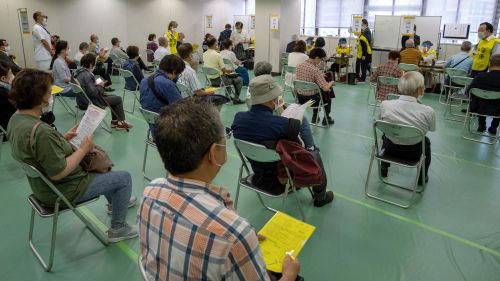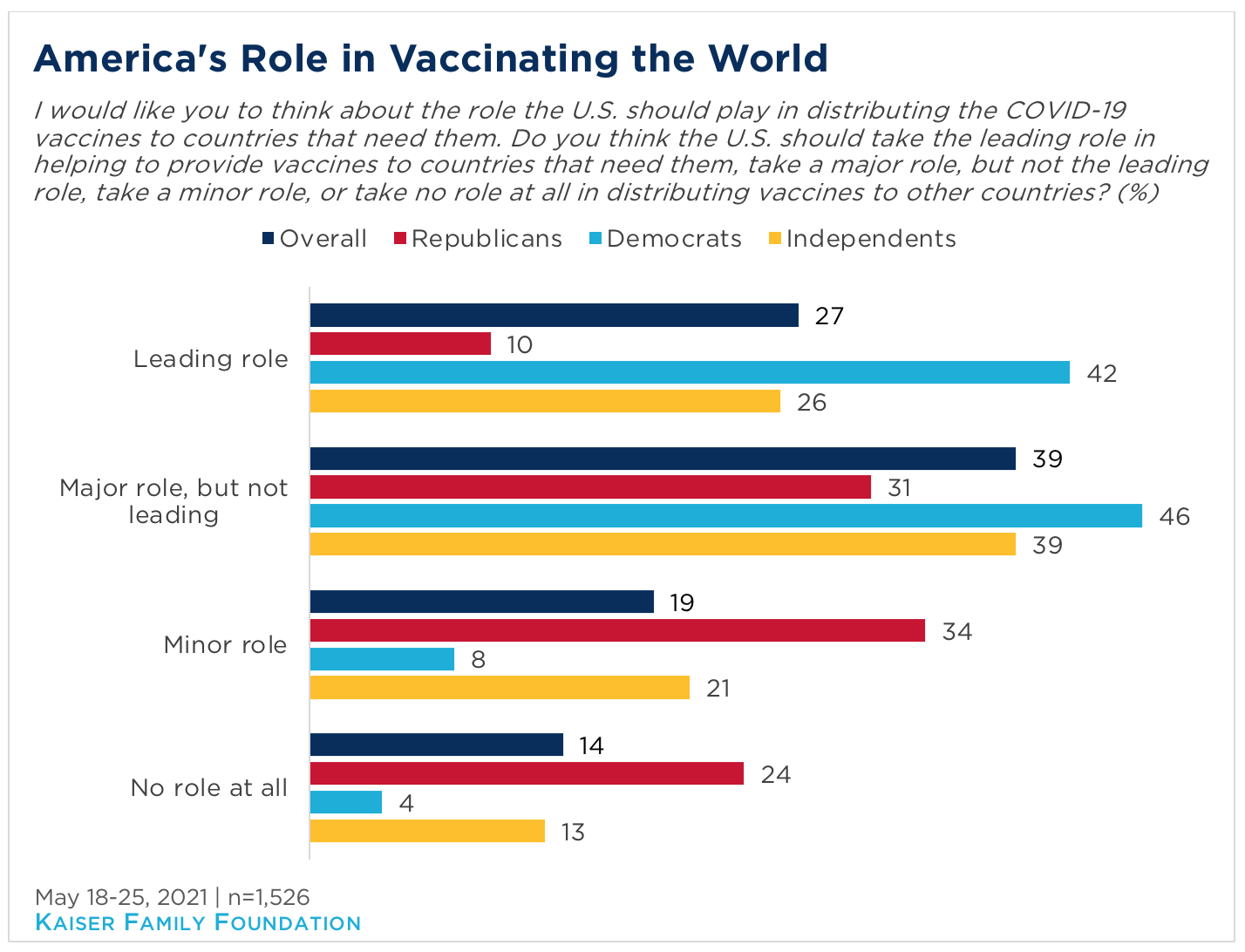As Vaccination Campaigns Continue Around the World, Restrictions Lift and Optimism Spreads

Some countries, now awash in vaccines, are looking abroad to help other countries combat the pandemic. For those with slower rollouts, the fight against the pandemic continues.
This week the world passed the 174 million case mark, with over 3.7 million deaths attributed to COVID-19. In many countries, vaccine rollouts are picking up steam and optimism about a return to normal is increasing. For this week’s COVID-19 update, the Chicago Council Survey team looks at polling results from the United States, Japan, South Korea, and France.
Key Findings
- A May 11-13 poll by Yahoo News and YouGov finds that two in three Americans (65%) favor the US government sending vaccine doses to other countries where infections are surging.
- In Japan, Yomiuri polling finds 50 percent of the public favors holding the Olympics while 48 percent say the Tokyo Games should be canceled.
- South Korea is considering a fifth round of emergency relief funds. A June 4 Realmeter survey shows that 38 percent prefer funds be given to the general public, 33 percent prefer funds be provided to vulnerable groups, and 25 percent oppose giving out funds.
- The French public is cautiously optimistic about its deconfinement, with six in ten (59%) believing that France will succeed in its deconfinement, and 44 percent saying France is in the process of coming out of the health crisis on a lasting basis.
The United States
33.4 million cases, 598,332 Deaths
The United States is nearing the 600,000-death milestone at a time when cases in the US are at lows not seen in over a year. New COVID cases, hospitalizations, and deaths all continue to decline, despite slowing progress in vaccinations.
With the pandemic under increasing control at home, Americans are looking abroad. The Biden administration recently announced that the United States will send 25 million COVID-19 vaccine doses to countries around the world. Though some doses will go directly to US neighbors Mexico and Canada, three-quarters of those doses will be going through COVAX, a joint venture set up last April by the World Health Organization.
Sharing vaccines with other countries is a popular move with the public: a May 11-13 poll by Yahoo News and YouGov finds that two in three Americans (65%) favor the US government sending vaccine doses to other countries where infections are surging. It’s also a move that gets support across party lines, with majorities of Democrats (78%), Independents (65%), and Republicans (58%) all backing the notion of helping countries in need of vaccines.
That the US is stepping up its international contributions will also help respond to criticisms from health policy experts that the US has abandoned its leadership role in fighting the pandemic. Taking on a major or leading role in vaccinating the world is a popular position among Americans—though there are notable partisan divisions. The most recent Kaiser Family Foundation Health Tracking Poll, conducted May 18-25, finds that two-thirds of Americans (66%) want the United States to play a major (39%) or leading role (27%) in distributing COVID-19 vaccines to other countries. Democrats are particularly enthusiastic, with nearly all supporting a major or leading role for the US in global vaccine distribution. Republicans are less enthusiastic about global vaccine distribution: a third (34%) favor a minor role for the US, and a quarter (24%) say the US should have no role at all in distributing COVID-19 vaccines to other countries.

Japan
766,068 cases, 13,704 deaths
With the July 23rd opening ceremony of the Tokyo Olympics just six weeks away, all eyes are on Japan and the course of the pandemic.
In a June 4-6 Yomiuri Shimbun poll, Prime Minister Suga’s net approval remains in negative territory (50% disapprove, 37% approve). Moreover, two-thirds of the public disapproves of the government’s handling of the pandemic, a peak in disapproval that has surged with each wave of infections. However, with cases starting to decline again, the recent gains in the fight against the coronavirus may have stopped the political bleeding for the prime minister. A plurality of the public (43%) wants to see him finish out his term as head of the LDP, though a third would like to see him stay on longer, either a few years (23%) or as long as possible (13%).
Japan is also racing to vaccinate its public. After a slow start that put it behind other G7 countries, Japan is now administering hundreds of thousands of doses a day. The vaccine rollout is meeting a warm public welcome, with JNN polling finding that two-thirds of Japanese (63%) want to be vaccinated (and fifteen percent say they’ve already received a dose). For those still waiting, not everyone sees it as urgent. In Yomiuri polling, while a quarter of Japanese (27%) want to get vaccinated right away, another 50 percent want to be vaccinated but say they are not in a rush.
The vaccination campaign’s recent successes also have yet to penetrate the public consciousness: a majority of Japanese (58%) don’t think the vaccination campaign is going well so far. And most Japanese (71%) are skeptical that Japan will meet its end of July target for fully vaccinating its elderly population.
Also coming at the end of July: the once-postponed 2020 Tokyo Olympic and Paralympic Games. Though organizers have sworn the Games will go on, Yomiuri polling finds the pubic split over the Olympics. Half of the public (50%) favors holding the Games—but those in favor are themselves split almost evenly over whether the Games should (24%) or should not (26%) have fans in attendance. Meanwhile, the other half of the public (48%) says the Tokyo Games should be canceled. One potentially motivating factor in this support for canceling the Games: concern about the effects hosting the Games will have on Japan’s fight against the pandemic. Six in ten Japanese (63%) say that the steps taken to prevent infections from those coming for the Games are insufficient.
South Korea
145,692 cases, 1,977 deaths
South Korea's virus tally has fallen compared to last week when it recorded 744 cases on Saturday. On June 8, there were 454 new cases. Infections, however, are increasingly being detected outside of Seoul. Daegu—a southeastern city that was hit hard by the first wave last year—and Jeju Island—a popular tourist destination—have decided to tighten social distancing protocols. Daegu’s mayor has also come under criticism after reports that the city negotiated with a foreign trading company to import Pfizer doses—separately from the central government—which turned out to be fraudulent.
On the bright side, as of June 5, around 15 percent of the total population have received their first dose. Eight in ten (81%) of those aged 60-74 signed up to get vaccinated. High participation is also seen in online bookings—a pilot program that began last month—where people can reserve vaccines left by those who did not show up. Anyone older than 30 who is not yet officially eligible can reserve AstraZeneca vaccines. According to a May 28 survey by Realmeter, 51 percent are willing to get these 'no show' vaccines. Nonetheless, many point out that it is difficult to find them in reality.
With only three months left until September, the government is planning on vaccinating teachers to ensure a safe start to the fall semester. Schoolteachers and education workers at elementary, middle and high schools, kindergartens, and daycare centers will receive Pfizer and Moderna vaccines. This announcement comes amid concerns over education gaps between the rich and poor. According to a survey by the National Education Council conducted among teachers in November last year, 90 percent think gaps would widen if online classes continue.
Meanwhile, recent cases and vaccine supply issues serve as reminders for South Korea to stay alert. On May 25, South Korea reported a total of four breakthrough cases—people who test positive after getting two doses. Rare blood clotting associated with the AstraZeneca vaccine was also confirmed on May 31 for the first time. Moreover, the government is short of 510,000 AstraZeneca vaccines. Low dead space syringes that maximize doses and schedule changes will be put into place when necessary.
The government is currently reviewing the possibility of providing emergency relief funds to the public for the fifth time. A recent June 4 survey by Realmeter shows that public opinion is divided—38 percent prefer funds be given to the general public, 33 percent prefer funds be provided to vulnerable groups, and 25 percent oppose giving out funds.
France
5.7 Million Cases, 110,299 Deaths
Despite recent ‘deconfinement’ measures relaxing COVID-19 restrictions, France has reported low numbers of new cases and deaths. The May 19 modifications allow shops, terraces, cinemas, and theatres to re-open, as well as extend the country-wide curfew from 7 pm to 9 pm Beginning June 9, France will begin the second phase of its re-opening process. This stage will allow indoor cafes, restaurants, and sports halls to open, and push the curfew back to 11 pm. If France is able to maintain consistently low cases through its second phase, the curfew will be altogether ended on June 30.
These adjustments have brought joy and a sense of relief to the French population, restoring their hope for a return to normalcy. A May 21 Odoxa survey reports that three in ten French adults (29%) and four in ten young people (42%)—those less than 35 years old—took advantage of the reopening within the first two days. The population appears cautiously optimistic, with six in ten (59%) French citizens believing that France will succeed in its deconfinement, and four in ten (44%) believe France is in the process of coming out of the health crisis on a lasting basis.
As the ‘deconfinement’ brings new hope for the future, French citizens have a renewed confidence in Macron’s promise to vaccinate the country by the end of the summer. Presently, 59 percent of French people believe the presidential promise that all willing and able French citizens and residents will be vaccinated by the end of the summer. Despite French optimism about a vaccinated future, that optimism has yet to affect Macron’s approval ratings, which have remained at 38 percent since last month. However, a successful vaccine campaign may increase his popularity, and boost his candidacy in time for the 2022 French presidential elections.

